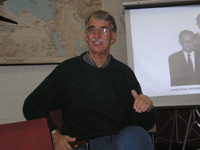Editor’s note: This is the latest in series of stories about the more than 50 Presbyterian mission workers and international peacemakers who are speaking in more than 150 presbyteries in the coming month as part of World Mission Challenge. — Jerry L. Van Marter
The seed of the Rev. Bill Soldwisch’s 25-year career as a Presbyterian Church (U.S.A.) mission co-worker in Mexico was planted by his pastor in Pasadena, Calif., when he was a teenager.
“Through his own mission service and his leadership of youth mission trips to Mexico, he taught that we learn a lot more about God and ourselves when we interact with Christians from very different places,” Soldwisch told a group gathered at First Presbyterian Church here Oct. 12. “It helps us focus more on who God is and what’s really essential and what’s peripheral.”
Through those conversations and mission trips as a teenager, Soldwisch said, “God put it in my heart that cross-cultural mission service was the only kind of faith work I wanted to do.”
Soldwisch was speaking as part of the World Mission Challenge — a month-long itineration of more than 50 PC(USA) mission workers and international peacemakers in more than 150 of the denomination’s 173 presbyteries. The challenge, which seeks to connect Presbyterians with the church’s overseas mission workers and enlist their prayer, communication and financial support, culminates Oct. 22-24 in Cincinnati with the World Mission Celebration.
In addition to the Mayfield church, in Western Kentucky Presbytery, Soldwisch has traveled to Puerto Rico and Transylvania Presbytery in eastern Kentucky.
Participants eagerly listened to his stories of planting new churches in Tijuana, Mexico, in partnership with the Presbyterian Church in Mexico.
“In the 1970s, Presbyterians in Mexico decided to plant churches in the 15 Mexican states, including Baja, where there were no Presbyterian churches,” Soldwisch said.
After graduating from San Francisco Theological Seminary in 1971 — Soldwisch served in the Peace Corps in the Philippines for two years between college and seminary and then served pastorates in western Washington and Guadelajara after seminary — he was asked to join the church-planting effort.
“It was kind of strange to be asked to do “overseas” mission work in Tijuana, because I’d grown up only 100 miles away,” Soldwisch said. He and his wife — whom he had met in the Philippines during his Peace Corps stint — went to Tijuana in 1984. Working in bi-national teams, they first helped establish Iglesia Presbiteriana Dios Habla Hoy (“God Speaks Today” — the same name as a common Spanish language Bible) in a middle-class section of Tijuana.
“We chose that spot so we could engage in outreach in poorer parts of the city without having to constantly worry about the congregation’s survival,” Soldwisch said.
That strategy paid off. Dios Habla Hoy has spawned several other churches and fellowships in the Tijuana area.
“The Mexican Presbyterian church has a real commitment to evangelism because they’ve always been a minority,” Soldwisch said, noting that Mexico is overwhelmingly Catholic.
“And their culture is such that if there’s not a church nearby, they will start services in their homes,” he said. “They have a grassroots evangelistic mindset and talk about their faith all the time. Others may not be so good talking about their faith, but they’re real good at inviting people to come along.”
Other partners have come alongside, Soldwisch said. San Diego Presbytery has an outreach ministry called Baja Presbyterian Missions that is partnering with the PC(USA)’s Presbyterian Border Ministry in organizing and building five congregations (to date).
Korean Presbyterian churches in Los Angeles are also active in the church-planting efforts and have established a seminary in Mexicali to train pastoral leadership for the burgeoning churches.
Recently a Phoenix-area congregation purchased a 50-foot construction trailer and refurbished and equipped it as a mobile health clinic for use in squatters and other low-income communities around Tijuana. The health clinic has become the catalyst for the development of two more new congregations.
“It is both a wonderful mission project for the church and a rich evangelistic tool for our ministry,” Soldwisch said.
For 25 years, Soldwisch has lived out the promise born in him during those teenage years.
“Mission work is constant giving and receiving, walking with and trusting God,” he said. “That and a constant focus on prayer.”
Soldwisch said that the PC(USA)’s Mexican partners “say the three most important aspects of evangelism are prayer, prayer, and prayer.”
For information about and letters from PC(USA) mission workers around the world, visit the Mission Connections Web site.

